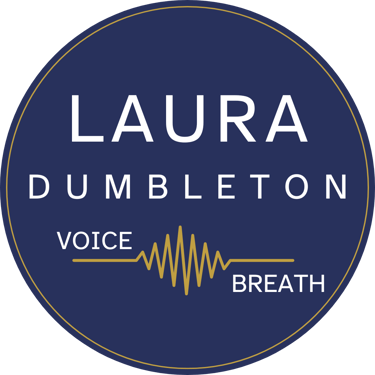How to Set Goals That Actually Work for Singers and Performers
Learn how to set clear, sustainable goals for your singing and performing. Build confidence, stay motivated and create lasting progress with your voice.
Laura Dumbleton
10/20/20253 min read


Every January, or September, or random Tuesday after a life epiphany, you tell yourself
"This will be the time I finally get it together! I’ll sing more. Perform more. Be braver!"
So you write the list, light the candle, make the tea and set the intention with a flourish! But somehow still end up staring at the same “to-be-done” list three months later. And nothing seems to change.
If that sounds familiar, you’re not broken. You’re human.
The truth is, most goals fail not because we’re lazy, but because we set them from a place of pressure instead of presence.
Why “do more” isn’t always the answer
Let’s take an example:
You're a singer and you decide your goal is to "perform more this year". Exciting, right?
Except somewhere between the planning and the doing, old memories sneak in. The tech issue at the last gig so nobody heard you, the audience that didn’t clap when they were supposed to, the lyric that disappeared from your brain mid-song that left you gaping like a fish.
Each of those moments left a little emotional breadcrumb of a memory; frustration, self-doubt, a whisper of “what if it happens again?”
So when you write "perform more", what your nervous system actually hears is "risk more disappointment".
No wonder you procrastinate and never tick it off the list!
Goals made from frustration tend to pull us further into control mode. And control mode is the enemy of flow, especially when you sing!
Before setting any goals, pause.
Instead of launching straight into a list of things to do, take a breath. Ask yourself:
What has actually felt good about singing or performing lately?
When did I feel most connected to my voice?
What drained me?
What inspired me?
We can’t build meaningful goals without noticing where we already are. Otherwise, we end up sprinting toward a version of success that doesn’t even feel like ours. And worse, it feels impossible!
Make your goals SMART-ish (but with soul)
Yes, the old SMART framework still works (Specific, Measurable, Achievable, Relevant, Time-bound ) but you, as a singer, need space for creativity, too. Just like vocal technique is the building block of singing, artistry is the creativity needed to bring your singing to life!
Instead of: “Perform more.”
Try: “Book onto one open-mic night within eight weeks and sing a song that I love”
Instead of: “Be more confident.”
Try: “Take five grounding breaths before rehearsals and notice how it changes my singing.”
Instead of: “Practice more.”
Try: “Spend ten minutes a day working on vocal exercises specific to me.”
Structure helps; rigidity doesn’t. Think SMART-ish: anchored enough to guide you, flexible enough to breathe.
Habits are quieter than hustle
We love a dramatic transformation story, but the real work is often small and deeply un-sexy. The five-minute warm-up you do daily will take you further than the once-a-month practice marathon. A short post-gig reflection teaches more than an endless critique session.
Setting yourself up for success looks more like committing to the "little things", and those "little things" grow momentum. And with momentum comes the achievement you were working towards. And with the achievement comes the knowledge that you've built a habit that will support you to the next achievement, and the next.
Your goals, your timeline
Progress isn’t linear, and it definitely isn’t one-size-fits-all. You might be someone who thrives on schedules, or someone who sings best when they are cleaning the house. You might be the in-betweener who needs a specific time to practice but not a rigid practice schedule. All these are completely valid, you just have to make time for those "little things" to work with you, not against you.
Let your goals serve your voice, not the other way around. And when things wobble (because they will), remember: wobbling means you’re moving. Falling off and starting again is progress. Starting something, deciding it's not for you and pivoting is progress. Anything that is geared towards your future is progress.
Remember, you can take a breath and begin again
You don’t need a new year, a new month, or a perfect mood to start. You just need one clear breath, one honest intention, and the willingness to show up imperfectly, consistently, and with a little bit of humour about the whole thing.
Because you’re not just setting goals for your voice. You’re learning to trust it. And yourself in the process.
Ready to explore what setting real goals for yourself feels like? Check out The Soundcheck Session.
